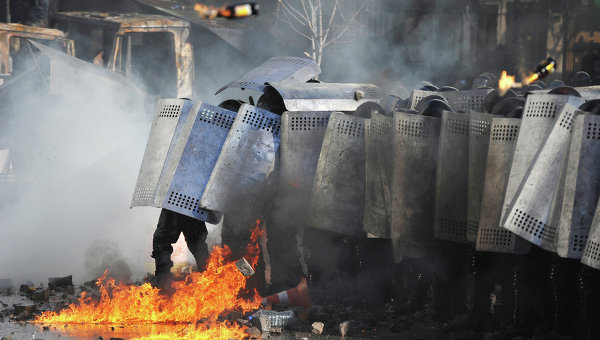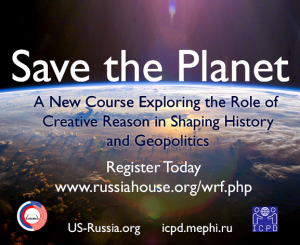
 KIEV, February 19 (RIA Novosti) – At least 13 people, including six police officers, were killed Tuesday in bloody clashes in the Ukrainian capital that are threatening to tip the former Soviet nation into outright civil conflict.
KIEV, February 19 (RIA Novosti) – At least 13 people, including six police officers, were killed Tuesday in bloody clashes in the Ukrainian capital that are threatening to tip the former Soviet nation into outright civil conflict. The scale of the violence prompted UN Secretary General Ban Ki-moon to appeal for restraint and "genuine dialogue” between authorities and the opposition. Russia, which has staunchly backed President Viktor Yanukovych, accused Western governments of fanning tension by interfering in Ukraine’s internal affairs.
The scale of the violence prompted UN Secretary General Ban Ki-moon to appeal for restraint and "genuine dialogue” between authorities and the opposition. Russia, which has staunchly backed President Viktor Yanukovych, accused Western governments of fanning tension by interfering in Ukraine’s internal affairs.
Unrest erupted in the middle of the day as thousands of people marched on the parliament building, where a standoff was taking place over proposed constitutional reforms the opposition said could provide a way out of the political crisis paralyzing the country.
Groups of mainly young men in masks and helmets wielding shields were confronted by riot police, who deployed rubber bullets, stun grenades and tear gas. Pictures from the front lines showed rioters ripping up cobblestones to hurl at police.
The violence that ensued lasted for hours and resulted in several deaths and hundreds of injuries.
Kiev city law enforcement officials said that six policemen were shot dead during the fighting and that more than 180 were injured, 35 of them critically.
A police spokesman said among the seven civilians killed during the clashes, three were shot dead and two died of heart failure. Another person was killed in a car accident, while one person perished in a fire, police said.
Police earlier said one person was also killed at the headquarters of the ruling Party of Regions, which was stormed by demonstrators Tuesday. It was unclear if that death was counted among the civilian casualties.
As darkness descended Tuesday evening, riot police pushed crowds back to the central Independence Square, which has served as the focal point of the largely peaceful protests that have been taking place since late November.
Anti-riot forces attempted to disperse the crowd using stun grenades and smoke pellets, and at least one water cannon was also deployed to douse flaming piles of tires ignited to deter police advances. Eyewitnesses reported online that at least one water cannon had been set alight.
 With the widening violence gripping his nation’s capital, Yanukovych could reportedly not be contacted by numerous European leaders. As midnight approached, he was reportedly meeting with opposition representatives, including Udar party leader Vitali Klitschko.
With the widening violence gripping his nation’s capital, Yanukovych could reportedly not be contacted by numerous European leaders. As midnight approached, he was reportedly meeting with opposition representatives, including Udar party leader Vitali Klitschko.
Justice Minister Yelena Lukash blamed opposition leaders for the worsening instability, saying that they bore "personal responsibility” for the day’s events.
Video footage posted online throughout the day showed vicious attacks by rioters on police, as well as incidents of police savagely beating prone protesters. Several journalists covering the day’s events also reported being attacked by police.
In a reversal of an opposition concession from a few days earlier, crowds seized the Kiev city hall, which served as the headquarters of the anti-government protest for nearly two months. The building was vacated Sunday in recognition of the authorities’ decision to free all the demonstrators that had been detained since the unrest erupted.
Kiev police said a group of young people, armed with truncheons, on Tuesday also attacked the Canadian Embassy, where they "smashed property and attempted to hurt employees of the diplomatic mission.”
While violence was escalating on the street earlier in the day, opposition deputies in parliament blocked the speaker’s rostrum in protest against pro-government deputies’ refusal to register a bill introducing reform to the constitution.
The bill was eventually registered, the opposition Svoboda party said later Tuesday on Twitter.
Opposition forces want the restoration of the 2004 constitution, which they say would transfer more powers to parliament from the president.
A parliament spokesperson said none of the draft resolutions to restore the earlier constitution submitted for consideration had met the requirement of 150 signatures to bring them to the floor.
Large-scale street protests erupted in Kiev and other Ukrainian cities at the end of November after the government backed away from deals to deepen political and economic cooperation with the European Union and instead opted for closer ties with Russia.



_jpg/250px-ElbeDay1945_(NARA_ww2-121).jpg)








